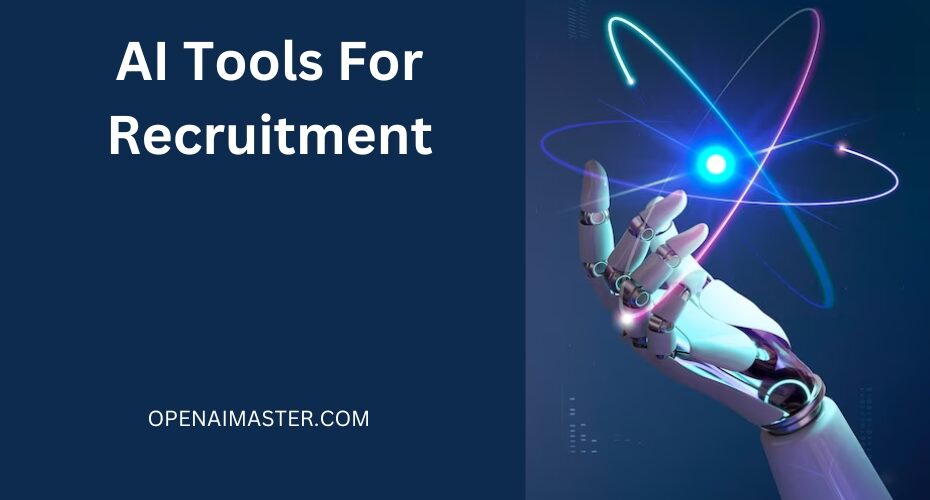Recruiting top talent has never been more competitive. Artificial intelligence (AI) gives your hiring team an edge by automating repetitive tasks, surfacing ideal candidates in your pipeline, and providing data-backed insights to inform your recruiting strategy.
This guide will compare the top enterprise AI recruiting tools while providing insider perspective on how advanced AI and machine learning are reinventing hiring. You’ll walk away with clarity on the leading technology solutions to enable your talent acquisition success this year and beyond.
AI Delivers Recruiting Results
Before diving into vendors, let’s look at the documented impact AI has on critical hiring metrics:
- 67% faster time-to-hire with automated tools, according to Ideal
- 55% more qualified candidates surfaced through AI screening versus manual reviews per [Harver](https://harver.com/blog/ai– recruiting-works/)
- 80% application completion rate increased using chatbots according to Mya Systems
- 50% cost-per-hire reduction reported from optimized recruiting process with AI as shown in Deloitte analysis
Without question, AI-driven software provides tangible recruiting results on key criteria like efficiency, candidate experience, and costs.
Now let’s explore tools at the forefront of reinventing hiring through advanced AI.
Top Enterprise AI Recruiting Solutions
Mature platforms from vendors like Skillate, Paradox, and HiredScore combine AI automation with deep ATS integrations, conversational interfaces, and actionable analytics. Emerging solutions like Fetcher focus specifically on AI-powered automation for top-of-funnel tasks.
All-Encompassing Solution: Skillate
Skillate stands out as the most robust, enterprise-ready AI recruitment platform. Integrating natively with your existing ATS, Skillate ingests historical hiring data and job description details to train advanced machine learning algorithms. It then matches open roles to suitable candidates – both in your database and from external sources.
Recruiters receive AI-optimized recommendations on targeting high potential candidates while avoiding biases that plague manual reviews. Further automation through Skillate‘s chatbot handles the heavy lifting of screening, scheduling interviews, and addressing candidate FAQs.
Advanced analytics supply multi-faceted insights to calibrate job descriptions, campaigns, and pipeline health with real-time tracking. For enterprise recruiting teams needing an all-in-one AI solution spanning automation, candidate matching, chat, and data, Skillate checks all the boxes.
Simplicity with Speed: Fetcher
Fetcher appeals to recruiters wanting targeted AI to eliminate repetitive, manual sourcing and screening. Integrations with your ATS and email enable Fetcher‘s automation engine to execute processes like:
- Identifying qualified candidates from job boards
- Personalizing outreach messages at scale
- Scheduling screening calls directly on your calendar
Rather than overhauling your entire stack, Fetcher inserts AI to shortcut discrete recruiting tasks – saving hours of work while accelerating hiring velocity. Expect 85% time savings on sourcing and 45% faster candidate response rates according to customers.
While Fetcher lacks comprehensive analytics of Skillate, its simplicity and speed upgrading specific facets of recruiting compel many buyers.
Conversational Interactions: Paradox.ai
Paradox.ai‘s differential lies in leveraging natural language conversations to engage candidates. Their AI chatbot conducts interactive, personalized screening and scheduling fully through text or voice chat.
With conversational AI, you provide a delightful candidate experience that makes progressing through applications frictionless. Having real-time dialogue also builds rapport and relationships vital for sales roles.
Paradox.ai gathers feedback to continuously improve its language models. Over time, the platform learns industry vernacular and role-specific screening techniques for smarter, more contextual conversations.
While focused solely on automating conversations, Paradox.ai‘s specialization in voice/text AI stands out from other tools taking a broader approach.
Emergence of OpenAI Recruiting Tools
Beyond enterprise suites, a new wave of startups like Wade & Wendy and Espressive leverage models like OpenAI‘s GPT-3 and Anthropic‘s Claude to deliver AI assistant capabilities specifically for recruiting teams.
These tools can generate job descriptions personalized to your open roles, draft outbound messaging to engage prospective candidates, schedule meetings adapting to personal preferences, and even provide tailored hiring advice and forecasts based on market conditions.
Powered by foundation models with billions of data parameters, these AI assistants act as customizable auto-pilots for recruiting tasks. As the models continue to advance in capability, recruiting assistants threaten to become as ubiquitous as email – radically transforming hiring yet again through AI‘s evolution.
Key Takeaways
- Leading enterprise AI recruiting tools like Skillate, Fetcher, and Paradox combine automation, integrations, analytics, and conversational AI to optimize hiring.
- Specialized tools focus distinctly on automation (Fetcher) or voice/text conversations (Paradox.ai).
- OpenAI platforms will soon enable AI assistants for recruiting teams via advanced natural language models.
- 67% faster hiring timelines, 55% more qualified candidates, and 50% lower costs are proven benefits from AI recruiting tools.
Rather than be disrupted, take charge by proactively implementing AI recruiting solutions within your organization. Spend time evaluating specific pain points and desired outcomes prior to shortlisting vendors. With more competitive job markets on the horizon, AI marks the next imperative for scaling hiring excellence.
